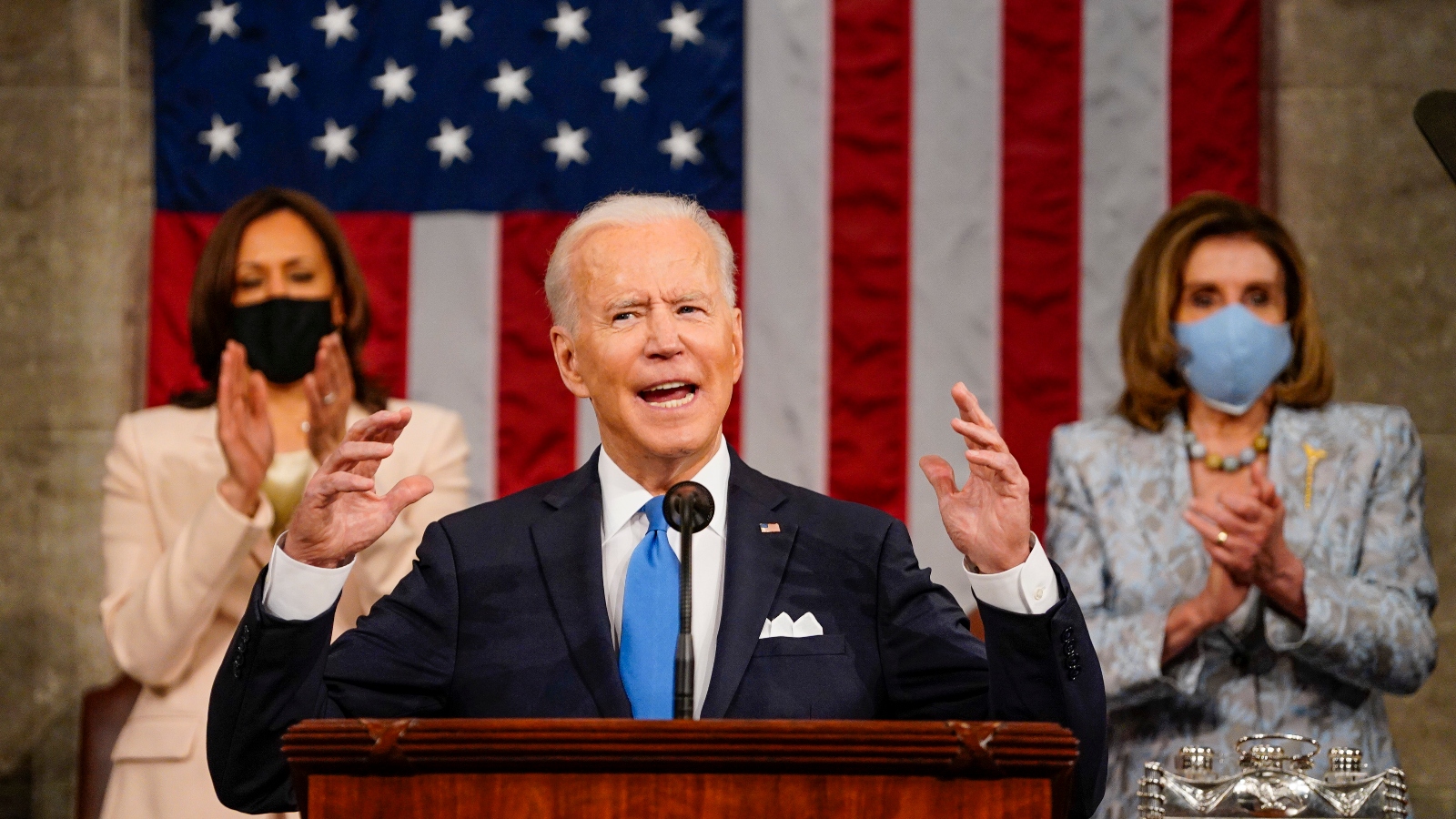When President Joe Biden thinks about climate change, he thinks jobs. And that’s exactly what he told the American people in his first speech to a joint session of Congress last night.
“For too long, we failed to use the most important word when it comes to meeting the climate crisis,” Biden said. “Jobs, jobs, jobs.”
As expected, Biden used his address to promote the American Jobs Plan, his $2 trillion green infrastructure proposal, and highlight his efforts to re-solidify the United States as a global climate leader. But he also did something slightly off the beaten path — he spoke directly to blue-collar workers and rural communities, who often feel left behind in the push toward a clean economy, and promised them that they will play a critical role in the transition. His messaging was clear: Embracing renewable energy — which will create economic, political, and employment opportunities for the United States — is downright patriotic.
Biden pointed out that nearly 90 percent of the infrastructure jobs created by the American Jobs Plan do not require a college degree, and 75 percent don’t require an associate’s degree, dubbing the proposal a “blue-collar blueprint to build America.” He identified construction workers and electricians as those who would usher in the country’s green future by building the power lines needed to transport renewable energy across the nation and installing electric vehicle charging stations in cities, homes, and along highways. He gave kudos to farmers planting cover crops to capture more carbon dioxide and posited that the blades for wind turbines could be manufactured by workers in Pittsburgh, rather than Beijing.
“So many of the folks I grew up with feel left behind or forgotten,” said Biden, who is from Scranton, Pennsylvania. “Our economy is so rapidly changing, it is frightening. I want to speak directly to you. Because if you think about it, that is what people are most worried about. Can I fit in?”
Biden’s efforts to engage blue-collar workers and rural communities in the energy transition reveal his desire to offset the dynamics of a GOP that tried to redefine itself as the party of the working class under Donald Trump. And after an analysis published earlier this month showing that nuclear energy and fossil fuel workers earn higher wages than those in wind and solar, the Biden administration is under pressure to convince the working class that it truly has their interests at heart. It’s also why, days after entering office, he established an interagency group to address economic revitalization in struggling coal and power plant communities.
Labor groups have come out in support of Biden’s efforts to use the clean energy transition as an economic boost for the nation’s middle class. Lonnie Stephenson, president of the International Brotherhood of Electrical Workers, described a new White House task force aimed at promoting collective bargaining as the Biden administration’s “most comprehensive approach yet to lift up workers and unions.” In a statement released yesterday, the labor group United Auto Workers said that Biden’s government investments and policies are focused on generating a “vibrant middle-class economy.”
Environmental groups have approved as well. “In his first 100 days, President Biden has taken bold and unprecedented steps to restore U.S. climate leadership, advance environmental justice, create jobs, and move us towards a pollution-free, 100% clean energy future where everyone benefits,” Abigail Dillen, president of the green group Earthjustice, said in a statement.
In addition to accomplishing shorter-term goals to engage labor groups, Biden’s address to Congress marked a broader shift in the way Democrats are trying to reframe climate action — identifying it as the path the U.S. must take to thrive economically, rather than just a mechanism for survival. It’s a theme that bleeds into Biden’s international climate goals, which entail becoming a leader not only in renewable energy generation, but in developing the technology and manufacturing the parts needed for wind turbines, solar panels, electric vehicles, and electric transmission. Biden continued to call out one country in particular that the U.S. could not allow to lap it in this sort of development: China.
China is currently winning the global race to be a leading technology supplier of the renewable energy transition, manufacturing a majority of the world’s wind turbines, solar photovoltaics, and lithium ion battery cells, which are used in electric vehicles. Polling has found it’s also the country Americans perceive as the U.S.’s greatest enemy — pushing back on China’s growing power is one of the few issues with bipartisan support in Congress. In Biden’s address, he portrayed climate action as urgent not because of the natural disasters growing ever more frequent and devastating — in fact, climate impacts didn’t come up once — but because the American people need to “win the 21st century.” In doing this, Biden is banking on patriotism and a deep-seated obsession with being number one to unite Americans and guide the country into a low-carbon future.
“As my dad would say, all the investments in the American Jobs Plan will be guided by one principle,” Biden said. “Buy American.”


